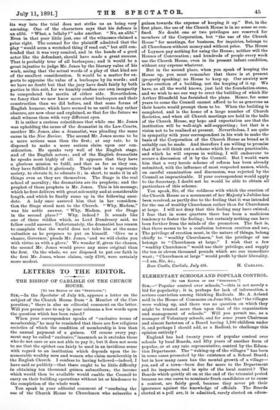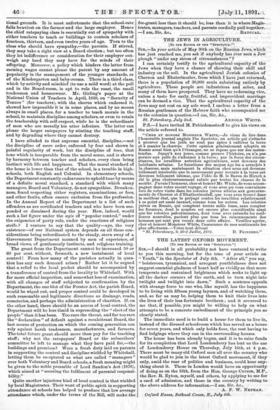ELEMENTARY SCHOOLS AND POPULAR CONTROL.
(To THU EDITOR OF THE " SPECTATOR:1
SIR,—" Popular control over schools,"—this is not merely a bid for popularity; it is, perhaps for lack of information, a serious conviction among thinking Radicals. Mr. A. Acland said in the House of Commons on June 8th, that " the villages were waking up, and there was no question on which they might be trusted more than upon that of the organisation and management of schools." Will you permit me, as a manager of Voluntary schools, and for some years Chairman and almost factotum of a Board having 1,100 children under it, and perhaps I should add, as a Radical, to challenge this opinion entirely ?
England has had twenty years of popular control over schools by local Boards, and fifty years of another form of popular, or at any rate representative, control by the Educa- tion Department. The "waking-up of the villages" has been in some cases promoted by the existence of a School Board; but in how many eases has the mental growth of a village— yes, and of a town—been due far more to the Department and its inspectors, and in spite of the local control ? The Boards which quietly sit on at the end of the triennial period because no one cares to nominate fresh candidates or to cause a contest, are fairly good, because they never pit their ignorance against the knowledge of officials. The Boards elected at a poll are, it is admitted, rarely elected on edues-
tional. grounds. It is most unfortunate that the school-rate falls heaviest on the farmer and the large employer. Hence the chief ratepaying class is essentially out of sympathy with either teachers to teach or buildings to contain scholars of fourteen, thirteen, and even twelve years of age. Turn to the class who should have aympathy,—the parents. If stirred, they may take a right view at a Board election ; but too often they let indifference or consideration for their employer out- weigh any heed they may have for the minds of their offspring. Moreover, a policy which hinders the latter from earning wages cannot please the parent by any amount of popularity in the management_ of the younger standards, or of the Kindergarten and baby-rooms. There is a third class, which by activity and mischief (to use a mild word) at the poll and in the Board-room, is apt to rule the roast, the small tradesman and homeowner. Mr. Girling's paper at the National Union of Teachers in April, 1889, on "Security of Tenure" (for teachers), with the chorus which endorsed it, showed how impossible it is in some places, and by no means always in small places, for a teacher to teach morals in the school, to maintain discipline among scholars, or even to retain the teachership with self-respect, while he is the subordinate of men who are morally his utter inferiors. The latter can please the larger ratepayers by stinting the teaching staff, and by degrading where they cannot destroy.
I have alluded to that supreme essential, discipline,—not the discipline of mere order, enforced by fear and shown in painful regularity of work, but the discipline of tone, that tone which is inseparable from the moral sense, and is shown by harmony between teacher and scholars, every class being instinct with life and happiness. That the moral standard of the home is lower than that of the school, is a trouble in high- schools, both English and Colonial. In elementary schools, the Department constantly endeavours to uphold tone by means of a definite moral standard, a standard with which many managers, Board and Voluntary, do not sympathise. Drunken- ness, fraud respecting either registers, examinations, or fees, and other faults, often ensure exclusion from the profession. In the Annual Report of the Department is a list of such offenders as are certificated teachers and who have been sus- pended or dismissed during the year. How, indeed, would such a list figure under the iegis of "popular control," under the exigencies of party rule, under the exactions of religious strife ? I venture to say that the quality—aye, the very existence—of our National system depends on all these con- siderations being subordinated to the steady, stern sway of a Government Department manned by men of experience, of broad views, of gentlemanly instincts, and religious training.
The grant from tbe Department cannot be increased 50 or 60 per cent. without, forsooth, a new instalment of local control ! From how many of the parishes actually in ques- tion has any such demand arisen ? Rather let it be argued that a relief to the local pocket should be accompanied by a transference of control from the locality to Whitehall. With far more official inspection, and somewhat less of examination, with all changes of staff subjected to confirmation by the Department, the one blot of the Forster Act, the parish Board, would be wiped out, and proper control could be developed in such reasonable and legitimate directions as drainage, roads, cemeteries, and perhaps the administration of charities. If, on the other hand, there should be an access of local control, the Department will be less timid in superseding the "elect of the people" than it has been. Too rare the threat, and far too rare the "declaration" of default against a recalcitrant Board, the last means of protection on which the coming generation can rely against harsh tradesmen, manufacturers, and farmers. The total future grant should more than pay for the teaching staff; why not the ratepayers' Board or the subscribers' committee be left to manage what they have paid for,—the buildings and premises ? Were a fresh duty laid on parents in supporting the control and discipline wielded by Whitehall, letting them be co-optated as what are called " managers " over both Voluntary and Board schools, a fresh meaning might be given to the noble preamble of Lord Sandon's Act (1876), which aimed at "securing the fulfilment of parental responsi- bility."
Quite another injurious kind of local control is that wielded by local Magistrates. Their want of public spirit in supporting attendance at schools has helped to produce that low average attendance which, under the terms of the Bill, will make the
fee-grant less than it should be, less than it is where Magis- trates, managers, teachers, and parents cordially pull together.



































 Previous page
Previous page